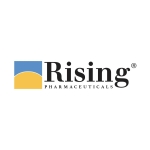Trial conducted at Columbia University will investigate potential of chloroquine phosphate to prevent symptomatic SARS-CoV-2 infections
EAST BRUNSWICK N.J.–(BUSINESS WIRE)–Rising Pharma Holdings Inc., the pharmaceutical company now operating as Rising Pharmaceuticals, today announced the support of a Phase 2 clinical trial designed to determine the clinical efficacy of chloroquine phosphate (CQ) in preventing coronavirus disease 2019 (COVID-19) in healthcare workers with moderate to high risk of exposure to SARS-CoV-2, the virus that causes COVID-19. Researchers at Columbia University are conducting this critical study to assess CQ as prophylaxis against COVID-19 in healthcare workers. A 100-patient study conducted in China found that CQ was superior to control treatment in patients with COVID-19 pneumonia, with no serious adverse events reported, and preliminary in vitro data suggest that it may also block SARS-CoV-2 infection.1
“In patients with lupus, CQ can alleviate symptoms via reductions in the production of type 1 interferon, a potent inflammatory molecule. This reduction is mediated by increasing the pH of endosomes, a component of intracellular transport, which inhibits endosome maturation and transport of interferon to the cell surface for release out of the cell,” said Anca Askanase, MD, MPH, Director of the Columbia University Lupus Center, Associate Professor of Medicine, Division of Rheumatology, at Columbia University Vagelos College of Physicians & Surgeons, and the lead investigator on this investigator-initiated clinical trial. “It has been suggested that inhibiting endosome maturation may also inhibit transport and release of new SARS-CoV-2 viral particles, which would reduce viral replication. While these early findings are intriguing only a prospective clinical study, such as the one we are conducting, can provide the data needed to understand the safety and efficacy of CQ in COVID-19 prophylaxis for at-risk healthcare workers. Protecting these healthcare workers is essential for providing the health services that are essential for managing and reducing the COVID-19 pandemic.”
The randomized, double blind, placebo-controlled Phase 2 trial will enroll 350 volunteers who work in direct patient care roles at Columbia University Irving Medical Center and who have contact with patients who may have COVID-19 infection. Participants will be stratified based on exposure risk, with moderate risk defined as patient-facing work in outpatient/in-house clinic at least two days per week and high risk defined as work performed in an intensive care unit, emergency room, or procedure room that contains aerosolized particles and high risk of contamination. Subjects will also be stratified by age (younger or older than 50 years of age). Subjects will receive 500 mg of orally administered CQ daily for one week and then 500 mg weekly for the duration of COVID-19 exposure. The primary endpoint is a 67% decrease in the number of at-risk health workers with symptomatic COVID-19 between the CQ and control arms (a decrease in expected infections from 15% in the control arm to 5% in the CQ arm). The secondary endpoints are a 67% decrease in the number of at-risk healthcare workers who develop antibodies against SARS-COV-2 (a measure of infection) between the CQ and control arms, the percent of patients with adverse events Grade 3 or higher, and the percent of patients with gastrointestinal intolerance to CQ.
“Healthcare workers are putting their own lives on the line to protect the lives of others, and they need prophylactic agents that effectively prevent SARS-COV-2 infection and COVID-19,” said Sharath Koripally, Head of Regulatory Affairs and Quality Assurance at Rising Pharmaceuticals. “The hypothesis and preliminary data supporting this trial are promising. We need to move quickly to generate statistically significant data that will enhance our understanding of the potential role that CQ may play in protecting healthcare workers. Columbia University is world-renowned for its expertise in implementing well-designed clinical trials that enable improved clinical decision-making, and we are pleased to work with them on this important trial.” Since 2011, Rising Pharmaceuticals has distributed Chloroquine Phosphate Tablets in the United States under an FDA approved drug application.
References
1 Gao J, Tian Z and Yang X. Breakthrough: Chloroquine phosphate has shown apparent efficacy in treatment of COVID-19 associated pneumonia in clinical studies. BioScience Trends. 2020;14(1):72-73.
About Chloroquine Phosphate, USP Tablets
Chloroquine Phosphate tablets are indicated for the: treatment of uncomplicated malaria due to susceptible strains of P. falciparum, P. malariae, P. ovale, and P. vivax; prophylaxis of malaria in geographic areas where chloroquine resistance is not present; and treatment of existential amebiasis.
About Rising Pharma Holdings, Inc.
Rising Pharma Holdings, Inc., a privately held company, sells generic prescription products and over-the-counter pharmaceutical products under the Rising label to leading wholesalers, chain drug stores, distributors, and mass merchandisers. The company continually seeks new opportunities to develop its business through strategic partnerships with manufacturers, marketers, and distributors under the Rising label.
Contacts
Glenn Silver
T. 973-818-8198
E. [email protected]







